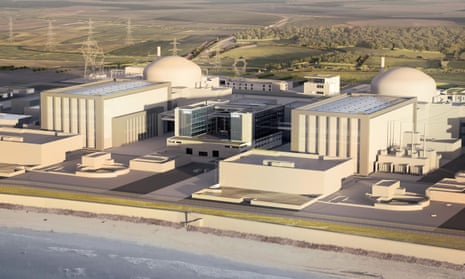The total lifetime cost of the planned Hinkley Point C nuclear power plant could be as high as £37bn, according to an assessment published by the UK government. The figure was described as shocking by critics of the scheme, who said it showed just how volatile and uncertain the project had become, given that the same energy department’s estimate 12 months earlier had been £14bn.
The latest prediction comes amid increasing speculation about the future of the controversial project in Somerset, whose existence has been put in further doubt by post-Brexit financial jitters.
Hinkley has been a flagship energy project for the British government and in particular for the chancellor, George Osborne, who lobbied hard and successfully for China to take a stake in the scheme.
Officials at the Department of Energy and Climate Change (DECC) on Thursday confirmed the £37bn figure, but said it was provisional, set in September 2015, when wholesale power prices were low, and would not affect bill payers.
“Hinkley will generate enough low-carbon electricity to power six million homes and around £10 [a year] from [each] consumer’s bill will pay for it once it is up and running. We have set the strike price to protect bill payers if energy costs go up or down, so the cost of the project to consumers will not change,” a DECC spokesperson said. “Today’s report from the IPA (Infrastructure and Projects Authority) does not suggest that the lifetime costs of Hinkley have increased. It is a sna shot of the position at the end of September 2015.”
EDF said the £37bn figure should be disregarded. “Hinkley Point C will generate reliable low-carbon electricity in the future, so a cost estimate based on last year’s depressed wholesale price is not relevant. HPC’s electricity will be competitive with other low-carbon energy options and consumers won’t pay a penny until the plant begins operating.”
But experts said the extra money, if the cost did remain at £37bn, would have to come from somewhere – probably the taxpayer – or be shaved off other DECC budgets available for different energy projects, such as windfarms and solar arrays. “This whole-life cost of £37bn is a truly shocking figure. It is an extraordinary ramp-up from last year’s figure, and just underlines how hard it is to get a real handle on the long-term cost of Hinkley,” said Paul Dorfman, senior research fellow at the Energy Institute, University College London.
The latest increase is a new blow to a scheme with an already precarious outlook due to the debt problems besetting its lead developer, EDF, which has been hit by rising costs and delays to another new-build nuclear power station scheme, at Flamanville, in Normandy.
EDF, a French group part-owned by the state, has high debt levels and has had difficulty convincing some of its own board members to support Hinkley despite the French government’s efforts to help it financially.
The Brexit vote has made the British commercial environment much more uncertain, and French trade unions, who want the final investment decision postponed, have been pressing independent directors to convince EDF’s chief executive, Jean-Bernard Levy, to ditch Hinkley.
Critics of the scheme have claimed that the fall in the value of the pound since the referendum vote will increase the costs of the scheme to EDF’s French contractors, who work in euros. But the management of the company said this week that the British referendum vote would not affect the project; it had completed its promise to consult further with the unions and was free to take a final investment decision.
“Backed by the studies already provided to the representatives of the workforce, EDF considers that this [Brexit] vote in no way changes the fundamentals of the project, nor does it alter the desire of those involved to take part in it,” the management said in a statement.
EDF directors , DECC and the French government have consistently repeated their determination to proceed with the already delayed Hinkley, which is expected to supply 7% of Britain’s total electricity when up and running.
But the EDF staff council last month began legal action to try to force the company to release documents relating the project, including all the contracts it had signed with the British government and its co-investor, the Chinese utility CGN.
The fall in power prices in the UK and continental Europe that has influenced the latest lifetime cost assessment for Hinkley is also responsible for some of the financial difficulties at EDF.
There have also been suggestions that Chinese investors are becoming more nervous about Hinkley and are demanding more concessions from EDF, so that more Chinese project managers and suppliers are involved. EDF has denied this.

Comments (…)
Sign in or create your Guardian account to join the discussion